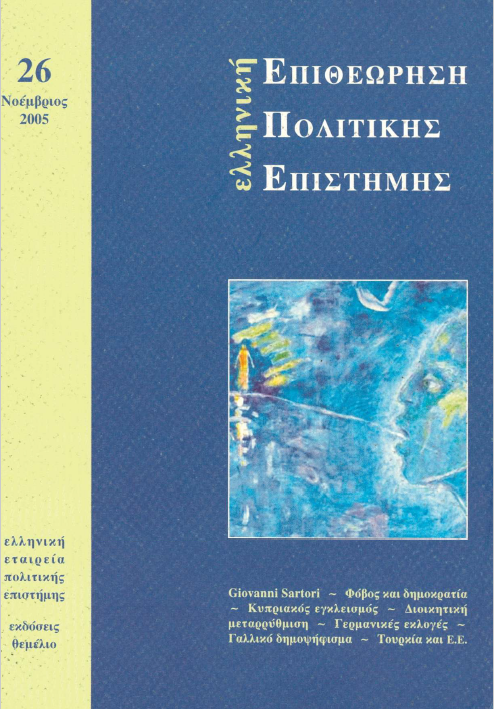The attitudes towards the dictatorship in the mass politics of the 3rd Hellenic Republic: an empirical approach
Abstract
This paper is based on exploiting the consequences of a singularity in the relationship of the political regime to historical time, a singularity which is inevitable in the case of authoritarian dictatorial forms of government. The paradox lies in the fact that these regimes, in abolishing representative mechanisms and the procedures of the democratic principle of legitimacy, also deprive themselves of the possibility of verifying their relations with society in a way which is credible and can be substantiated. Consequently, this means that when the regime is in existence, while its structures produce assuredly full and multi-dimensional political results, as a rule there is a major cognitive vacuum regarding the attitude of citizens towards it. On the other hand, these regimes, no matter how short-lived, constitute in themselves a historical phase in the périodisation of their national social formation and not some deviation from it, with clear harbingers in the period «before» and tangible extensions into the period «after». The article aims to investigate precisely this double dimension of the Greek military dictatorship, intending an approach to the question «30 years after the dictatorship: What about it?». The empirical data on which this approach is based are drawn on political research with national population samples, which was carried out by the National Centre for Social Research (EKKE) in the years 1985, 1988, 1989, 1990 and 1996. These data have a serial form, given the identical repetition of variables in all or most of the research. This offers the possibility of investigating the extent to which the attitudes under study display a diachronic tendency. It is within this framework that the ideological and value dimensions of the dictatorship are approached. The core on the basis of which positions and conclusions are formulated with regard to aspects and versions of the dual scheme democracy/authoritarianism, are the findings concerning two variables: citizens’ attitudes towards the dictatorship and the degree of sympathy or antipathy for its leader, George Papadopoulos. A first approach to these data and their linkages leads to two basic conclusions. First, attitudes towards the dictatorship of 21st April and its leader present a sufficiently noteworthy stability. This can be interpreted if it is taken into account that they are closely related with more structural ideological and value parameters in the mass politics of the Third Hellenic Republic. The second conclusion is that the attitudes which constitute this syndrome are articulated in conjunction with the polymorphic crisis of the public space in Greece after 1986-1987 in a dual way: On the one hand, they are reinforced as an alternative to the premature devaluation of the institutions and rules of the model of mass politics, in which the principle of democratic legitimacy has been implemented for the first time in decades. On the other hand, they influence the de-articulation of the cohesion of the «democratic faithful»’s attitudes towards the public space. These two phenomena are located within a broader problématique concerning the ways in which the globally dominant tendency to deregulate politics is expressed in a country like Greece, where what has recently been named the democratic deficit has constituted a diachronic constant combined with a «gelatinous» public space which has been emaciated in terms of its institutions, values and symbols.
Article Details
- How to Cite
-
Καφετζής Π. (2017). The attitudes towards the dictatorship in the mass politics of the 3rd Hellenic Republic: an empirical approach. Greek Political Science Review, 12, 36–56. https://doi.org/10.12681/hpsa.15126
- Issue
- Vol. 12 (1998)
- Section
- Articles

This work is licensed under a Creative Commons Attribution-NonCommercial-ShareAlike 4.0 International License.
Authors who publish with this journal agree to the following terms:
Authors retain copyright and grant the journal right of first publication with the work simultaneously licensed under a Creative Commons Attribution licence that allows others to share the work with an acknowledgement of the work's authorship and initial publication in this journal.
Authors are able to enter into separate, additional contractual arrangements for the non-exclusive distribution of the journal's published version of the work (e.g. post it to an institutional repository or publish it in a book), with an acknowledgement of its initial publication in this journal.
Authors are permitted and encouraged to post their work online (preferably in institutional repositories or on their website) prior to and during the submission process, as it can lead to productive exchanges, as well as earlier and greater citation of published work (See The Effect of Open Access).






